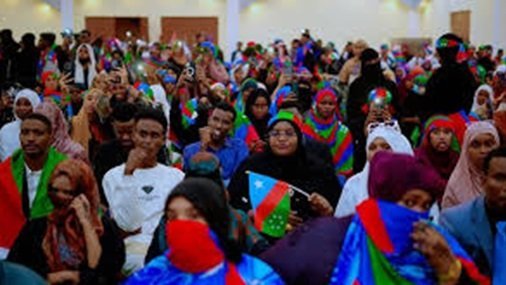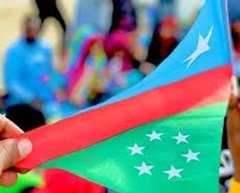By Abdullahi A. Nor
Mogadishu, as the capital of Somalia, holds a symbolic place in the hearts of all Somalis. It is meant to be a space of unity, safety, and equality. However, for citizens of South West State, this ideal has been increasingly undermined by discrimination and systemic harassment.
In 2024, a series of incidents has escalated the sense of exclusion felt by South West State citizens in Mogadishu, and these actions appear to be part of a broader pattern of marginalization.
Celebrations Met with Discrimination

While celebrations in Mogadishu have often been an opportunity for people from different federal member states to showcase their cultural ties to the capital, South West State citizens have found their flag day celebratory gatherings met with hostility. In Nov 12, 2024, a peaceful celebration by young people from South West State was disrupted by aggressive armed security forces, despite similar events by other regions passing without incident.
Additionally, South West State’s soccer players have been targeted in two separate incidents of harassment while in the capital. South West State has repeatedly voiced complaints over harassment of its people in the capital, most recently recalling an attack on its athletes who were competing in the regional states’ sports tournament, an incident that ultimately led to their withdrawal from the event, intensifying concerns about the city’s inclusivity. Such actions raise serious questions about whether Mogadishu can truly claim to represent all Somalis or if it has become a space that caters to the interests of only certain clans.
The harassment faced by South West State citizens has been well-documented, with clear video evidence of the perpetrators. Yet, the authorities have failed to hold anyone accountable. The lack of response to such behavior sends a disturbing message: that the capital is only safe for select groups. This failure to act only fuels division, erodes trust, and alienates the citizens of South West State, leaving them feeling increasingly marginalized. If these incidents remain unchecked, they risk fracturing Somalia’s already fragile national unity. For a country that aspires to peace and inclusivity, such actions undermine the very foundation of the Somali state.
This disgraceful action has caused significant concern, with MP Mohamed Abukar, a South West State representative, said, “Whenever people from South West come to Mogadishu to celebrate, they are harassed. If they are celebrating for their flag day, they are also harassed. We will ensure that those responsible are held accountable.”
The Himilo Qaran Party, led by former transitional government President Sheikh Sharif Ahmed, also condemned the incident, describing it as an assault on the youth. “The Himilo Qaran Party strongly condemns the attack on South West State youth, who were peacefully celebrating when security forces were deployed against them, resulting in injuries and suffering,” read a statement from the party. The statement also highlighted that young people from South West State were specifically targeted, which it called unacceptable, especially since other regional groups celebrate similar events freely in the capital. Himilo Qaran has called for the immediate arrest of the officers involved in the incident, demanding legal action in accordance with the law. “It’s unacceptable to single out innocent youth who committed no crime. The party calls on security forces to swiftly take action against those who harassed citizens peacefully celebrating,” the statement continued.
In contrast to Mogadishu, people from South West State celebrated freely in Garowe, the capital City of Puntland, without any harassment. Vehicles across the city displayed the South West State flag, and the event was held at Garand Hotel, one of Garowe’s best and largest venues. This celebration in Garowe highlights a welcoming atmosphere in Puntland for South West State citizens, demonstrating a level of inclusivity and respect not seen in Mogadishu, where recent festivities have been met with tension and hostility.
Suppressing South West Voices in Government
The mistreatment of South West State’s citizens extends into the political sphere as well. Recently, Abdulkadir Nur Hussein Maah, the Chairperson of the Somali Academy of Science and Arts (SOMASA), was rightly and promptly removed from his position by the Prime Minister’s office. This dismissal occurred just hours after Maah wrote a letter advocating for the exclusion of the Maay-Maay dialect from the Somali Constitution, a proposal that many in South West State viewed as an attempt to erase their language and cultural identity. In contrast, Hon. Abdirashid Jelly, a prominent South West State representative, was dismissed by President Hassan, from his position as Envoy for Humanitarian Assistance after he publicly condemned the derogatory remarks made by the Director General of the Ministry of Transport. The selective dismissal raises significant concerns about the government’s commitment to freedom of expression and highlight the risks faced by anyone speaking out against discrimination.
The Struggles of Lower Shabelle: A Call for Change
The situation in Lower Shabelle, part of South West State, has also become increasingly dire. Residents of the region have expressed frustration with both the administration of President Sharif Hassan and the current leadership under President Laftagareen. Many believe that the region’s problems are being ignored or mishandled, and they fear that any future changes will only exacerbate the issues unless meaningful reforms are made. The region’s elders and politicians are caught between the desire to speak out about these issues and the fear of political retribution. This has created a chilling effect, where important truths about the situation in Lower Shabelle are left unspoken.
Despite the challenges, there is hope that the people of Lower Shabelle can come together, as communities like SSC have done, and demand a solution that comes from within. True change will only come if the people of Lower Shabelle are allowed to have a say in their future, without fear of being silenced or marginalized.
A Call to Action for Somali Leaders
The actions against South West State’s citizens demand a response from all Somali leaders. Members of Parliament representing South West State must take a stand against the harassment and marginalization that their constituents face. Somali unity cannot be achieved if citizens are not treated equally, regardless of their regional affiliation. The ongoing discrimination against South West State residents undermines the principles of fairness and equality that should guide the nation. It is crucial for the government to act swiftly to restore trust and demonstrate accountability. Only then can all Somalis feel safe, valued, and equal in their capital city, Mogadishu.
The ongoing discrimination against South West State citizens in Mogadishu and the mounting issues in Lower Shabelle demand urgent attention and action from Somali leaders. The recent actions and systemic bias faced by citizens from South West State, alongside the growing crisis in Lower Shabelle, highlight an alarming trend that could tear apart the fragile unity Somalia desperately needs. It is imperative that Somali leaders, particularly Members of Parliament representing South West State, stand up against these injustices and advocate for meaningful reforms.
The government must take immediate steps to address the harassment and marginalization faced by South West State citizens in the capital. This includes holding those responsible for harassment accountable, addressing inflammatory remarks by high-level officials, and ensuring that all Somali citizens, regardless of their regional background, are treated equally under the law. The ongoing silence from the federal government on these issues sends the dangerous message that discrimination is permissible within Somali governance, risking further divisions.
Abdullahi Ahmed Nor
Email: abdulahinor231@gmail.com


Leave a Reply